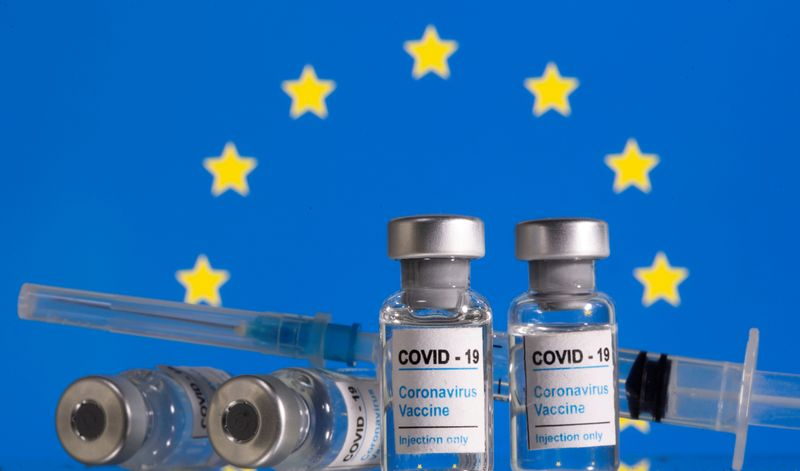EU slightly cuts estimates for vaccine deliveries this year By Reuters

By Sabine Siebold and Francesco Guarascio
BRUSSELS (Reuters) -The European Commission estimates European Union countries will receive about 900 million doses of COVID-19 vaccines in the second half of the year, compared to nearly 1 billion shots it expected a month ago, an internal document showed.
The document, which the EU executive shared with EU leaders at a summit in Brussels on Thursday, also showed the EU is forecast to receive fewer doses in the first half of the year, compared to its own predictions in late May.
This is not expected to affect the EU’s target of vaccinating 70% of its adult population in the summer, but it indicates that supply difficulties may still force changes in vaccine rollouts.
The document, seen by Reuters, showed the bloc forecast it would get about 500 million doses in the third quarter of the year, and another 400 million between October and December from four makers: Pfizer/BioNTech, Moderna (NASDAQ:MRNA), AstraZeneca (NASDAQ:AZN) and Johnson & Johnson (NYSE:JNJ).
In the first half of the year, the EU has received 424 million doses, the document said, showing deliveries expected until June 27. That has allowed it to vaccinate with at least one dose 220 million people, or 60% of the EU’s adult population.
In another internal document, seen by Reuters and presented to EU leaders at the end of May, the EU Commission had estimated 980 million doses would have arrived in the second half of the year, of which 529 million in the third quarter.
It also had expected 519 million vaccines in the first six months of the year, nearly 100 million more than it has actually received so far.
The small drop in the third quarter is mostly caused by a reduction in supplies due from Johnson & Johnson, which has faced production problems.
The U.S. company is forecast to deliver only 7 million doses in July, the EU document shows, after it was expected to miss its supply target in the second quarter.
Pfizer (NYSE:PFE), the EU’s main supplier, is forecast to deliver slightly fewer vaccines in the last quarter of the year than the EU expected in May, the documents show.

